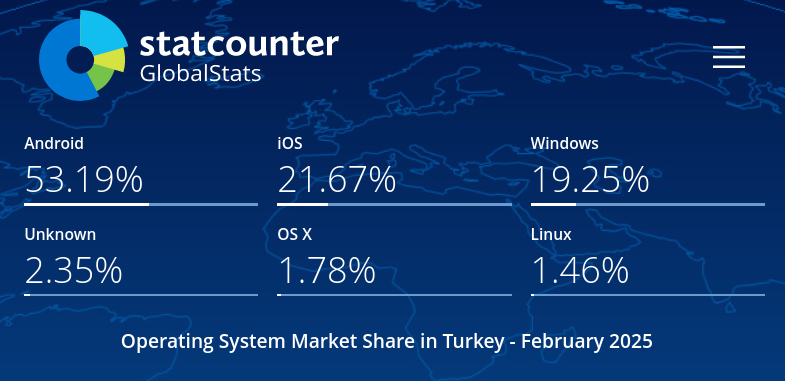The Ludicrous Mythology of Commonality as Signal of Value, Merit, Popularity
Devalue what's true, promote marketing?
In Turkey, Apple and Google are "more popular" than Windows/Microsoft, based on "market share".
LAST night in IRC we belatedly advanced an article entitled "Which Operating System Should You Choose for Your Next PC?" (link, but it's not a good article; don't bother).
The article conflates popular with common. Windows is common. It's not actually popular. OEMs compel people to use it by bundling or tying. "IF they allow you to choose (usually they do NOT)," we said in IRC.
We also joked in IRC: "WHY THE HECK WOULD YOU WANT US TO INSTALL AN OS WITHOUT BACK DOORS?!?!"
OEMs typically impose ChromeOS, macOS, or Windows on buyers. Those aren't secure and aren't meant to be secure. It's becoming increasingly obvious that our governments want security only for themselves.
Days apart that very same network of sites said about Ubuntu: "It's the most popular [sic] distro for a reason."
No, it's not. Many people still use it, but that does not make it "popular". This is a logical fallacy, whose banality can be illustrated by this new post; just because many people adopted GitHub (for the 'free' hosting) does not mean it's a good thing to be doing. Days ago we complained that the FreeBSD Foundation had "Outsourced Everything to Microsoft Proprietary Software" in this one particular imitative and now we see the same in pkgsrc (NetBSD):
Quick bit of background: NetBSD is still using CVS as its version control system. The decision to move to something else has been taken long ago, but the switch has not happened as of today.Working with CVS is painful for many reasons. For instance, there is no way to see your local changes without waiting several minutes for a cvs up -n. A full tree update (cvs up) churns for quite a while before it even starts updating any files.
I met Taylor (riastradh@) last year, and he told me about his git-based workflow. I must say I have become a convert! I use the GitHub mirror as my main source tree. Yes, it adds GitHub (and thus Microsoft) as an intermediary, but I don’t mind. Below, I am going to describe my workflow and play through an example.
While it's true that many people use GitHub (many left GitHub when Microsoft took over), that does not make it OK. Moreover, as an associate put it, the above shows "drinking the Microsoft [GitHub] Koolaid, betraying FOSS roots as there are so many other, better choices out there..."
Hosting one's own Git repo isn't hard and making (or adding) a front end for it isn't hard either. We did both and we're a small team.
Years ago Microsoft tried to tell us that Linux could not attract young developers because it didn't use GitHub. The Microsoft employee who led this was a mole inside the Linux Foundation, who at the same time or in the same term tried to crush Daniel Pocock. It was a form of Social Engineering, as Pocock puts it. █


